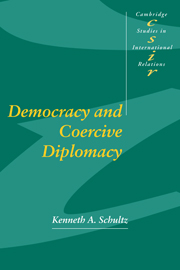Book contents
- Frontmatter
- Contents
- List of figures
- List of tables
- Preface
- 1 Introduction
- Part I Theory
- Part II Empirical analysis
- 5 Selective threats, effective threats: the initiation and escalation of international crises
- 6 Credibility confirmed: the implications of domestic support
- 7 Credibility undermined: the implications of domestic dissent
- 8 Conclusions and implications
- Appendices
- References
- Index
- CAMBRIDGE STUDIES IN INTERNATIONAL RELATIONS
8 - Conclusions and implications
Published online by Cambridge University Press: 08 October 2009
- Frontmatter
- Contents
- List of figures
- List of tables
- Preface
- 1 Introduction
- Part I Theory
- Part II Empirical analysis
- 5 Selective threats, effective threats: the initiation and escalation of international crises
- 6 Credibility confirmed: the implications of domestic support
- 7 Credibility undermined: the implications of domestic dissent
- 8 Conclusions and implications
- Appendices
- References
- Index
- CAMBRIDGE STUDIES IN INTERNATIONAL RELATIONS
Summary
This book sought to address the following questions: How do domestic political institutions affect the way states behave in international crises? How do the institutions and practices of democracy influence the use of threats to wage war, the way such threats are interpreted, and ultimately whether or not crises can be settled short of war? Answering these questions required that we take a step back to ask a more basic set of questions: Why do states fight wars? What factors determine whether disputes become crises and whether crises escalate into wars? In Chapter 2, I argued that wars occur when states have private information about their expected value for fighting and conflicting preferences over the allocation of international goods. Private information creates uncertainty over the range of negotiated settlements that are mutually acceptable. Conflicting preferences create incentives for states to manipulate their private information strategically, thus complicating efforts to reduce this uncertainty. As a result, much of state behavior in international crises revolves around efforts to reveal and exploit private information through the use of threats and other signals. And the outcomes of crises – who wins, who loses, and whether the dispute is resolved through war or diplomacy – depend crucially on the success or failure of these efforts.
Given this logic, the question of whether democratic institutions affect the likelihood of war could be restated: Do democratic institutions influence the way information is revealed during the course of crisis bargaining? Chapters 3 and 4 answered this question in the affirmative. I argued that institutions designed to facilitate the operation of representative government have unintended consequences for the availability of information internationally.
- Type
- Chapter
- Information
- Democracy and Coercive Diplomacy , pp. 231 - 246Publisher: Cambridge University PressPrint publication year: 2001



